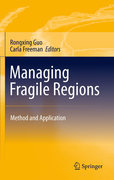
This book gathers the work of leading scholars from several disciplines to address fragile regions, especially those whose goal is to preserve, strengthen or create processes to restore or reestablish security and effective socioeconomic management. It tackles the multifarious issues that shape and affect fragile regions, and draws upon a wide range of intellectual and methodological perspectives, from such fields as area studies, natural resource science, biology, environmental and resource economics and management, and political economy.The volume brings together diverse viewpoints from a group of contributors who hail from Australia, China, Hong Kong, Indonesia, Japan, South Korea, and the United States. Managing Fragile Regions: Method and Application discusses a variety of factors – natural, political, administrative, legislative, economic, social, and cultural – and examines how they exert influences on the operational mechanisms of fragile regions, especially in the contexts of peace and security, economic development, and environmental management. The volume's eightchapters cover a wide range of examples of fragile regions and their challenges. It will be of interest and utility to practitioners and policy-makers engaged in disaster management and post-disaster reconstruction. Students, researchers, and other professionals involved in resource management, regional science, and environmental science will also find it valuable reading. Presents an in-depth, field-based study of the impact and recovery from the 12 May 2008 Wenchuan, China earthquake Provides practical information and policy recommendations for the recovery from natural disasters in years to come Addresses issues such as natural resource impact, ecological damage, threats to minority cultures, and environmental recovery INDICE: Studying Fragile Regions: An Interdisciplinary Overview.- Fragile Edges between Security and Insecurity: China's Border Regions.- DMZ and Destiny of the Divided Korea Peninsula.- Territorial Fragility and the Future of Tibet: Sub-sovereignty, Problems and Solutions.- Boundaries, Territorial Disputesand Water Insecurity: Evidence from the Lower Mekong Basin.- Understanding the Determinants of Livelihood Recovery after a Large Earthquake.- The Characteristics of Earthquake-induced Geo-hazards in Mountain Areas.- NGOs and their Roles in Post-Earthquake Reconstruction
- ISBN: 978-1-4419-6435-9
- Editorial: Springer
- Encuadernacion: Cartoné
- Páginas: 200
- Fecha Publicación: 14/09/2010
- Nº Volúmenes: 1
- Idioma: Inglés
